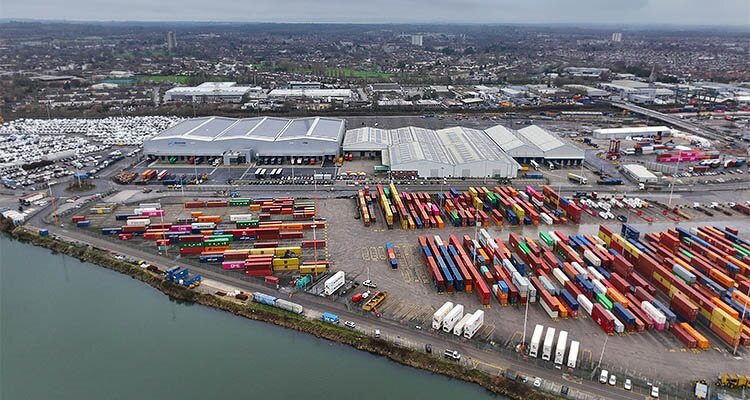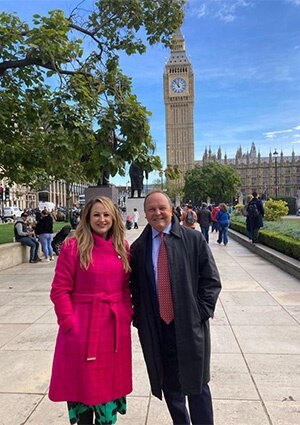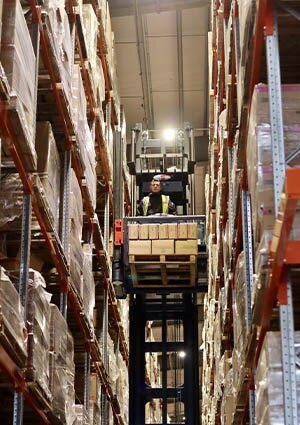
TLI is joined by Mike Thomas and Joanne Gumery to platform Delamode International Logistics’ resilience against supply chain disruption
When the Transport & Logistics International team arrives at Southampton Docks in a Ford C-MAX, the security guard points out that our ‘lorry is very small.’ There are chuckles all round as we weave among the cranes, containers and hauliers, following directions towards Delamode International Logistics’ 436,000 square-foot quayside warehousing facility. The docks are expansive, and it is remarkable to imagine that many of the goods moving to and from the UK and continental Europe are shipped through this 65,000 pallet facility.

The European and UK logistics sector has had to contend with significant disruptions over the last eight years. First, there was Brexit. Then, 2020 brought the Covid-19 pandemic, which changed consumer behavior and impacted supply chains across the globe. Once we tried to return to business as usual, the war in Ukraine sent energy costs soaring, and now unrest in the Red Sea is also affecting international shipping routes. It seems never ending.
However, Delamode International Logistics (Delamode) has ploughed on to overcome these challenges, working hard to maintain reliable services for its clients. The specialist in shipping, handling, warehousing, order processing and distributing fast-moving consumer goods (FMCG) supply chain services has been refining its operations for the last 40 years to keep its conveyor belts moving. “I’ve been in the warehousing industry for several decades,” begins Mike Thomas, the company’s Client Services Director, “and I don’t think I’ve ever lived through such a turbulent period in supply chain logistics.
“Back in 2016, when the Brexit vote took place, my immediate reaction was: how are we going to protect our clients’ international supply chains? We had a great trade position with Europe. We also enjoyed a pricing advantage with the imbalance of trade providing cost-effective distribution from the UK to continental markets. All of that was about to unravel for us as Brexit added cost challenges and restrictions to the free flow of international trade with our nearest market neighbors.
“More recently, we’ve experienced a rollercoaster ride in warehousing storage availability, which manifested initially in a capacity shortage. This was then followed by a surplus of storage space when demand for PPE and product overstocks increased dramatically. Now, having made it through those hurdles, we have a crisis in the Middle East where missile attacks in the Red Sea are impacting the movement of deep-sea shipping, which is our lifeblood,” he shares.
As Client Services Director, Mike brings to the business years of experience in logistics, having worked with some big industry names – P&O and Inchcape to name a couple. Following those career progressions, he became a shareholder and Director of Import Services in 2005, before selling to Delamode in 2018. He then transferred as a director of the company’s logistics business. In our discussion, Mike is keen to outline the ways in which the company has navigated supply chain challenges, with client service always at the helm.
Joanne Gumery also joins our conversation. Joanne, who only recently joined Delamode as Sales & Marketing Manager, offers her perspective on the business’ approach to the competitive nature of warehousing within supply chains. “There is so much more space available in warehousing businesses across the UK,” Joanne affirms, “but there are more challenges around the cost base, while taking into consideration inflationary pressure. So, for us, the question is, how do we continue to put our clients first, and ensure they’re still receiving value for their money?”
It’s a critical question. Fortunately, Delamode is well placed to provide excellent solutions. According to Mike, the business is uniquely positioned to weather industry disruptions. “Our ethos and client-centric attitude really helps. Secondly, team culture is important. We’ve developed our values, and we work to enact them as best we can. We have also developed a very fortunate logistics offering by consciously investing in high-grade, purpose-built, warehouse facilities, and we continue to exploit the unique advantage of being adjacent to the container terminals, quayside at Southampton. Why is that important? Well, speed-to-market provides clients with a business edge, bringing FMCG into the UK and continental Europe. For the latter, we operate an innovative daily link to our 3PL offering, in Roosendaal Holland, our EU gateway facility. Delamode’s ability to turn around products quickly, and consolidate orders via back-haul to hubs in the Midlands also enables us to cut time, cost, and carbon from supply chains,” Mike explains. He adds that the company commissioned an independent study with the University of Southampton to analyze this proposition. The outcome showed Delamode’s port centric model for FMCG can cut as much as 20 percent carbon emissions from an import supply chain. “So, instead of trucking containers from the port inland, and running back to port empty, we’re devanning just 200 meters from the side of the deep-sea container ships. We can then receipt the product under a customs bond. This is hugely advantageous when it comes to deferred VAT and duty payments, which is only added after the sale of the product is made to end customers. Some of these attributes have really defined us, I think, as something very special in the logistics market,” Mike says.
Mike and Joanne also reveal in our conversation that the leaders are members of the UK’s Warehousing Association (UKWA), with Mike serving as the Chairman. The organization represents 100 million square feet and 1000 members across the UK, and celebrates its 80th anniversary this year. In honor of the milestone, its agenda involves 80 warehouse tours, roadshows, conferences, industry lobbying, training excellence for new generation teams, net-zero initiatives and valuable roundtable discussions. The celebrations will allow both leaders to platform Delamode’s capabilities to stay at the forefront of best practices within the industry.
We then steer the conversation towards the topic of technology. Recently, the company has made significant investments in optimizing its digital opportunities. The installation of a new WMS system is one such example on which Joanne elaborates: “Functions like real-time portal access for our clients ensures that their goods are fully tracked and traceable, right through the order process. This is powerful information, and assists our clients with the visibility required to make informed decisions. It’s also particularly helpful when trying to navigate the supply chain challenges Mike mentioned. 
“It also helps with integration. When you’re talking about high volume, these operations can’t be done with basic systems. Everything requires interconnectivity now to avoid duplication and manual intervention. So, this installation brings efficiency to our logistics services and enables our clients to focus on their end goal, which is selling their products, and tackling any issues that could impact their orders,” she explains.
It seems that digitalization is gaining more significance across the logistics sector. For Delamode, this is an opportunity to improve productivity, and empower its teams with the necessary tools to fulfil their work accurately and to the best of their ability. “The competition is tight,” Mike says. “If you look at countries like France, for example, the cost of labor has been particularly high for decades, which has pushed early investment in automation ahead of the UK. Furthermore, post-Brexit, the UK no longer benefits from a ready supply of labor. However, at Delamode, we saw this coming and commenced our program of investment some years ago, which allowed us to transition from a labor-intensive agency-based operation to a more highly trained, permanent team that is empowered by efficient systems and facilities.
“We still have a way to go, but we have made the hard yards and laid strong foundations with our new WMS. This step also enables the technology designed for our VNA forklifts, which will boost efficiency and contain supply chain costs for our clients. We plan to share these benefits in the latter half of this decade. I believe this client partnership delivery of value is what will keep us ahead of the curve,” he shares.
Moving away from the technical side of the conversation, we then discuss the company culture. As Joanne is a fairly new face to the business, she is best equipped to offer insight into what it’s like to work for Delamode. “When I first interviewed for the role, I was asked about my values, to which I replied that teamwork is the first one. Second is that it’s crucial to be passionate about what you do. Finally, there must be real benefits in what you offer the client base. It just so happened that my values are aligned to Delamode’s. Once I came on board, and we talked more about those values, we undertook a quick project where the HR department asked the staff, ‘what do each of these values mean to you?’ Some of the responses incorporated the notions of hard work, passion, pride and drive, alongside respect and understanding. And what we try to do is embed those responses into our culture. I haven’t worked for a company before where there’s been so much communication, in terms of asking how we’re feeling, and not simply asking, but acting on those answers, and following up on them. I think that is key to a successful business; internal communication and working together as one.”
With these pillars in place, the future looks bright for Delamode. Mike shares that the company’s strategy going forward is to consolidate business activity at the Southampton facility. Furthermore, he notes that Southampton is currently geared to a B2B offering, which ‘is relentless.’ “We’ve got 24 doors where containers come in and out. We can flex from one-to-three shifts 24/7, if necessary, in peak times. For B2C, the warehousing layout and configuration requires different approaches, and we are refining these processes at our Braintree facility, so we can be ready to scale-up when opportunities arise,” he says.
Joanne adds that clients can expect more automation, and the business’ warehousing capabilities will be better showcased. “We’ve made excellent strides in terms of Southampton DC’s infrastructure and now we will move this approach into our satellite operations. Traditionally, Delamode is renowned for freight forwarding and transport services, but not so much for warehousing logistics. We are now promoting this aspect both internally and externally as a group to enable Delamode’s forwarding and transport customers to take full advantage of efficient handling, bonded storage, high volume order processing, pick, pack, POS fulfilment and value-added retail logistics services, including reverse logistics,” she concludes.
Under the company’s leadership team, who all share Mike and Joanne’s vision of excellent client service, continued innovation, and growth, Delamode is set for a prosperous future. As a pioneer in the warehousing logistics industry, this company will endeavor to provide trusted supply chain solutions, adding real value with a business edge for its clients, despite the ever-changing landscape.